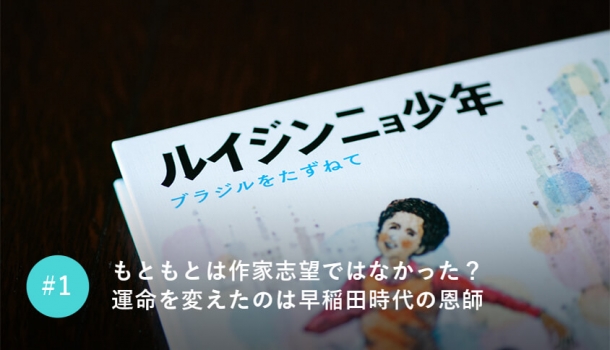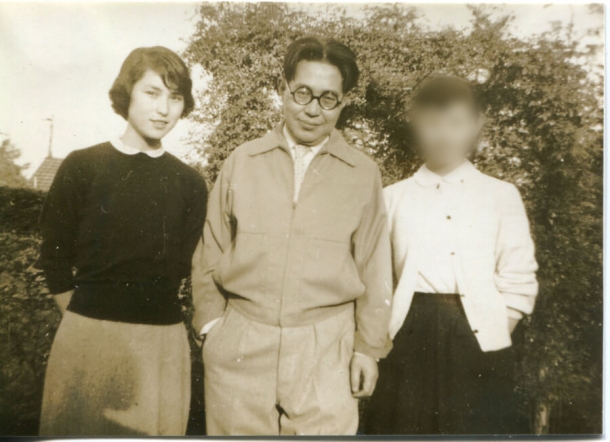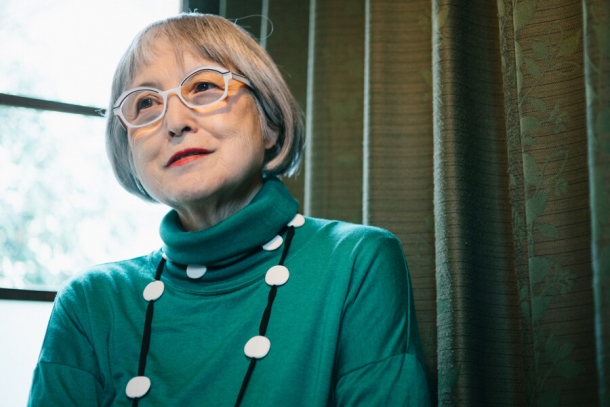
#1 Originally, You Didn’t Want to Be a Writer? How a Teacher at Waseda University Changed Her Destiny
ーQ.You were a late blooming author. If I understand correctly, you released your first book, Brazil and My Friend Luizinho (published by Poplar), when you were 35.
Kadono: That’s right. When I was 34, around eight years after I returned from Brazil (in 1959, Kadono moved to Brazil, where she lived for two years), I received a phone call from one of my teachers at Waseda University. This teacher was Naotaro Tatsunokuchi, a researcher of American literature and translator of many works, including works by Truman Garcia Capote and William Somerset Maugham. The year was 1969; the Olympics had concluded and the country was waiting in anticipation of Expo ‘70 in Osaka. Over the phone, Tatsunokuchi asked if I was interested in writing about by experience in Brazil for a book being planned by a publisher, which was preparing to release it to coincide with the expo, based on the theme of “the world’s children.”

Kadono (right) as a student at Waseda University, together with a classmate and Naotaro Tatsunokuchi
ーQ. You’re saying it was a phone call from a teacher that launched your writing career?!
Kadono: I was taken aback at first and assumed someone else would be writing the story. But then he said, “No, you’re writing it.” Tatsunokuchi was a very renowned translator at the time, on par with the likes of Motoyuki Shibata (professor emeritus at Tokyo University). At Waseda, there was an association called Roku Pen Kai, which focused on reading British and American literature in English. I was a member of that association, but there were other members who were more diligent than me. That’s why initially I thought it was impossible for me to write a book.

ーQ.So from thereon you wrote about your friend Luizinho, whom you met in Brazil. I heard that once you put your pen to paper, you couldn’t stop writing and finished 300 pages over the course of one week.
Kadono: I had a lot on my mind, and there were so many special memories I wanted to write down. But the publisher only wanted 70 pages.
ーQ. Oh no!
Kadono: So I shorted it. As I was revising the draft, I realized I enjoyed the writing process. More so than getting the chance to release a book, I was most happy discovering that I enjoyed writing. Up until then, I enjoyed reading, but not writing.
ーQ.You returned to Japan when you were 26 and released your first book when you were 35. During that time, I assume you were busying with parenthood. Did you feel a sense of urgency at the time?
Kadono: Not really. I had a stimulating and fulfilling life, so I didn’t feel like I needed to do something. I was still relatively proficient at English at the time, so I had toyed with the idea of starting my own translation company. But it wasn’t something that I really wanted to do; it was just a thought.
I did work at Toho for a bit though. At that time, the film production company had merged with Shin Toho, which was making a lot of yakuza films that they wanted to promote overseas, and I was tasked with writing the film synopsises in English. It was a part time gig that I balanced with parenting.

Kadono’s experience in Brazil greatly affected her. In addition to Brazil and My Friend Luizinho (published by Poplar), she also wrote A Girl Named Nada (published by Kadokawa), which is set in Rio De Janeiro.
ーQ. In the afterword of the reprint of My Friend Luizinho, you wrote that, using Google Street View, you were able to find the room you stayed in 60 years ago.
Kadono: Street View is fun. I can see the places I traveled to. I traveled to Brazil once more after returning to Japan, but 30 years have passed since then. I thought it’s surely changed by now, but it actually hasn’t. Sure, it’s a bit older, but it’s still there.
【#2】 I Don’t Write Because I’m an Author. I Write Because it’s My Calling.
【#3】Living Your Own Life Without Getting Constrained by Society’s Standards



